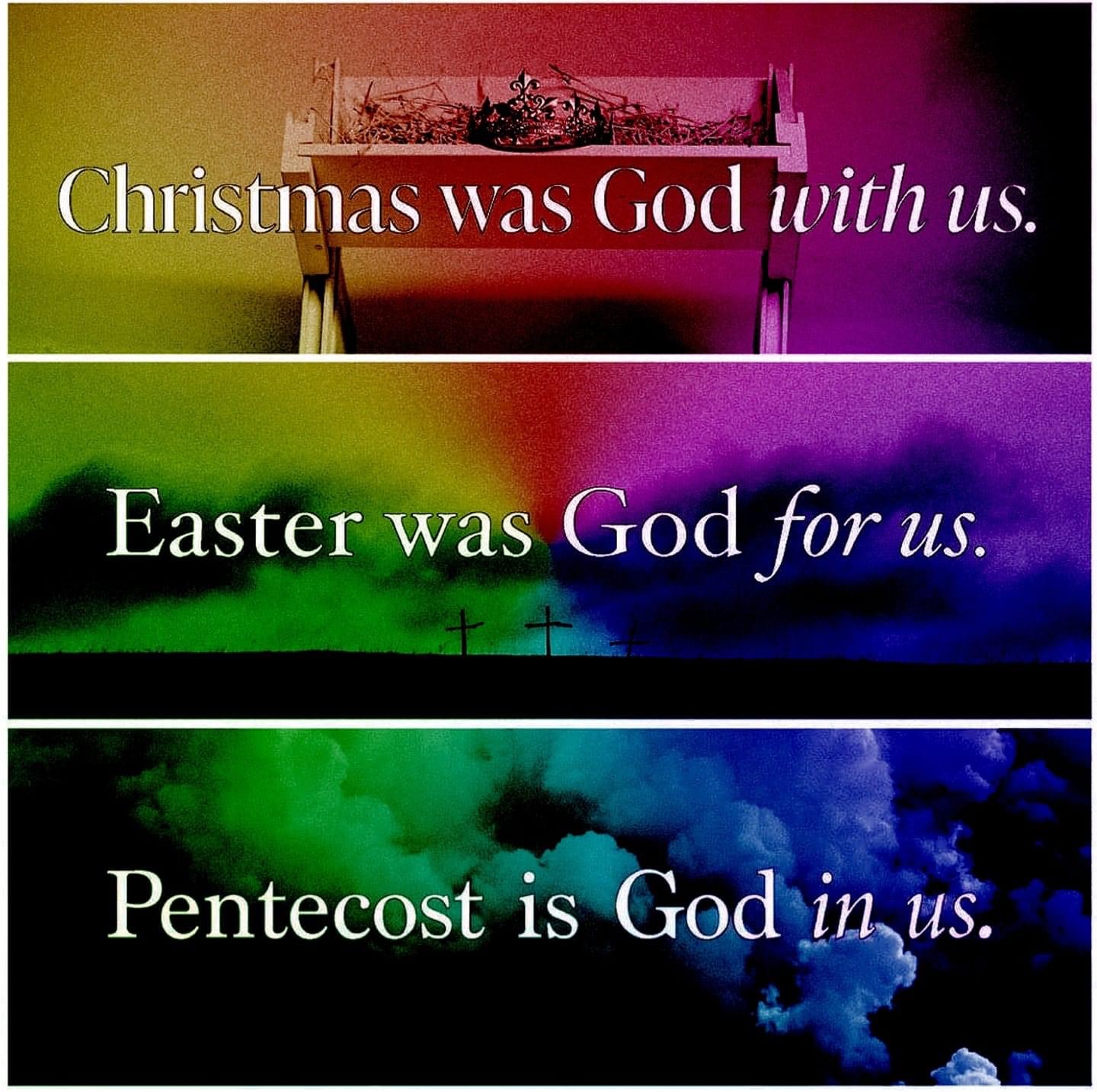
We have had Elections; then the opening of our houses to others or not depending upon where you live – talk about a postcode lottery; we have had Pentecost and now today Trinity Sunday. I wonder whether people have really understood the politics underlying all of the government policies, understood the various Covid rulings regarding access to houses, and what do people make of Pentecost and the Trinity, especially those outside of our churches. What has just happened?
Trinity Sunday
With Trinity Sunday we celebrate the 4th C understanding of God, that of God, the Son in Jesus and the Holy Spirit – 3 in 1. There was a huge amount of politics resting on this conclusion. People were excommunicated if they did not believe in this doctrine. To be particularly modern, the pronoun for the Holy Spirit can be either or all, as the grammatical gender of the word for “spirit” is feminine in Hebrew (רוּחַ, rūaḥ), neuter in Greek (πνεῦμα, pneûma) and masculine in Latin (spiritus), so gender fluid. Does it matter? What does matter is that God, the 3 in 1, is with us.
Church today?
It was a Helen Cameron, a theologian within the Methodist Church, who said (in her book Resourcing Mission, p7) that there are three types of people: Churched, those who regularly attend services etc; the Dechurched, those who have been and no longer wish to attend any more, through a variety of reasons – mostly negative; and the Unchurched, a growing proportion of society who see no relevance whatsoever in Church. I think labels in general can be unhelpful, but in today it may be relevant.
What’s in a verse?
Back since the 1980s you might have seen this person – the Rainbow Man – at American sporting events. He would attend around 80-100 events each year. As you can see he wore a rainbow coloured wig, but also carried a large sign or wear a t-shirt which would display John 3:16. It would seem that knowing that verse would signify great things. Does it? I’d encourage you to read both Chapters 3 and 4 of John’s Gospel in one go – remember that Chapters and verses where only added in the 16th C (1551) – where there we can read of the man who may not listen and the woman who acts immediately. It may have written as a radical comparison.

Nicodemus on a journey
We hear of this character Nicodemus, a Pharisee, a Jewish leader, one of the Temple, who has seemingly broken ranks and has come to speak with Jesus at night. Recall that Jesus in this Gospel, has just overturned the tables in the outer Temple area. Perhaps Nick’s diary was full in the day, but it might make the meeting easier at night – fewer people might have seen him perhaps.
Nicodemus wasn’t probably a believer when he met with Jesus – was he trying to ‘advise’ him to be careful? – hey keep your head down. He listened to what Jesus was telling him but he was struggling. Was he really open to what was being explained? He may well have come with an agenda so unless Jesus’ words conformed to Nicodemus’ understandings he might not have been willing to really engage with that material. Do we possibly see that in us, when we visit someone who is slightly more radical than us, different to us, we might find it difficult to engage with them?
Nicodemus could have taken away what Jesus said, regardless whether he believed it or not, and would have looked all well. Nicodemus could have identified as either unchurched – which feels a little harsh given his deep beliefs in the Jewish Torah, the first five books of our Hebrew Scriptures; or de-churched. He may have had a tendency to agree with Jesus and his teachings, but now he finds himself in a perplexing situation as he returns to Temple duties with the other Jewish leaders the next day.
In John Chapter 7 we can read that Nicodemus is one whom defends Jesus – his beliefs are now more than mere words, expressions, but he is starting to demonstrably show that faith – even if we are talking about the principles of Jewish law.
Unchurched to Churched?
In John Chapter 19 he is the one who arrives with a huge amount of ointment to wrap Jesus ready for burial. What a journey Nicodemus has been on. He has come from meeting with Jesus in the dark, away from prying eyes; to making a verbal stand, to identify him as a possible follower; to bringing such costly gifts when Jesus had been tried, crucified and was soon to be buried, he is now an out and out follower. Have we gone from Unchurched – to Churched? What has just happened?
More than a sign?
I think he demonstrates more than someone carry a sign saying John 3:16, for belief means actions, actions of love.
In another text for today: Romans 8:12-17 we read of Paul’s concern about sides arguing.
I do not know whether you have tried reading the letter to the Romans in one go? Personally, I think it is quite tough. I often find Paul’s grammar difficult to follow, then again I wasn’t trying to write in Greek and then for some one to translate it to English. Rome was, when the letter arrived, a hot bed of academia, a population of around a million. There were imperial decrees and fine poetry, so a tent maker cum ex-Pharisee Jewish leader trying to write some argument about one God rather than many gods possibly wouldn’t have made the best seller list. Of course the emperor was already a god, so trying to argue for one god was not a great start. Paul was also writing to folk he had never seen – so it is quite an ask for him to know how to write to them.
It is a letter to encourage both Jews and gentiles, people or communities where God is present would be a good description of its theme.
What was the context of Paul’s letter? He has written this from Corinth, many miles away, from a place with a very different population: notably of ex-slaves trying to make it with a different life. This letter was probably hand delivered by a deacon called Phoebe. Paul has understood that there have been many Jewish ‘Jesus believers’ who have come to attend Gentile house churches. This has caused some discord with many. Often when we have two different groups, both vying for what is in reality the same thing, there’s a lack of harmony.
Clashes today and yesteryear – still binary
What has just happened? In Israel recently we have continued clashes between Jews who seek to hold onto the land given to them back in 1947/48, and Palestinians who seek to hold onto their claimed land: the capital of Jerusalem remaining a focal point – as it is with the Muslims and the Al Asqa Mosque. I have been reading about the long battles within Ireland in the 19th C, where Protestants and Catholics fought over land. Surprising to me, it wasn’t necessarily their faith which was the decisive factor, but the way they treated each other.
We have experienced perhaps the recent incidents in Glasgow- the immigration dispute in Pollokshields, where comments about a Covid spike deflected from the main argument; the march to George Square after Rangers secured the SFA Cup and League Championship unbeaten, but where anti-Catholic songs were accepted; the next days march to the same place with a protest about Israeli attacks into Palestine were met with accusations that this had no place in Scotland. It is so hard to remain one side or the other. Our history, our past, may cause us to move one way or the other. Does our faith alter that stance?
Moving our own position?
Our passage speaks of the Spirit speaking on our behalf, that we are children of God. Remember whom Paul is speaking to: both Jews and gentiles, in a polytheistic society. So if we are referring to clashes between Jews and Muslims, Protestant and Catholics, Unionists and Nationalists, Paul would understand. Paul is in the minority for a start, but seeks to listen to the arguments of each other – go to Acts 17 for an example. He wishes to bring people together, not cause further division.
By listening to the other person, really seeking to genuinely understand their argument, not to see if they could score points, quick wins, but to get alongside, even accepting that their own argument might shift we start to find harmony, even possibly unity. The concept is called the Overton Window. However, after many years that we have journeyed in our Christian faith, we may still find that there are new things that emerge, new understandings, even ideas concepts we might see from another’s’ perspective. Here, a Jew, an educated Pharisee who saw – well he never even – according to the Bible – saw Jesus but knew that …this was the way, Jesus’ way, desired that harmony. Not to win an academic battle, not to shut down the argument, but foster dialogue – for in that we build community.

What is our takeaway?
Whenever we see the news, read a newspaper, listen to the radio and imagine the scene, scroll the latest news on our computer, mobile or tablet, could we consider the bigger picture. Not the political gambits, the posturing for votes, but where is God’s kin_dom here? Where is the harmony possible? Can we see an opportunity in our social media posts to broker relationships rather than cause possible discord, can we seek to really understand the other person’ argument not shutting it down – even encouraging dialogue? What has just happened? Can we change?
It was interesting how you opened your piece about elections , politicians , often we want politicians to sort our problems , but where do we go at 3 o clock in the morning , when our heart is breaking , were probably crying out in depair , for me that is the wonderful thing about God , hes there even when the politicians have gone to bed